From the local to the world. An interview with Mr. Nakamura who runs an e-commerce site for barbers, Barber & Apparel Nakamura Shoten, on the story behind his success. (Written by Midori Ohashi, HUFFPOST JAPAN)
The cross-border e-commerce market is once again in the limelight, driven by the weak yen. It presented an opportunity for small- and medium-sized enterprises to enter the global market.
Barber & Apparel Nakamura Shoten, an e-commerce site for barbers established by Hiroshige Nakamura who runs a barbershop in Okayama Prefecture, Japan, is one of the cross-border e-commerce stores from a local area.
We interviewed Mr. Nakamura about the secret to success in the global marketplace for small businesses while remaining local.

Mr. Hiroshige Nakamura, a barber, and President of Barber & Apparel Nakamura Shoten
"When I was a child, I used to admire a middle-aged barber who lived a free and easy life."
Please tell us about your professional journey
I opened a barbershop in Okayama City, Okayama Prefecture in 2004. In 2014, I launched Barber & Apparel Nakamura Shoten, which sells hair cutting capes* for barbers. I now work as both a barber and an e-commerce store owner.
* A cape you wear to prevent hairs and stains on clothes during haircuts.
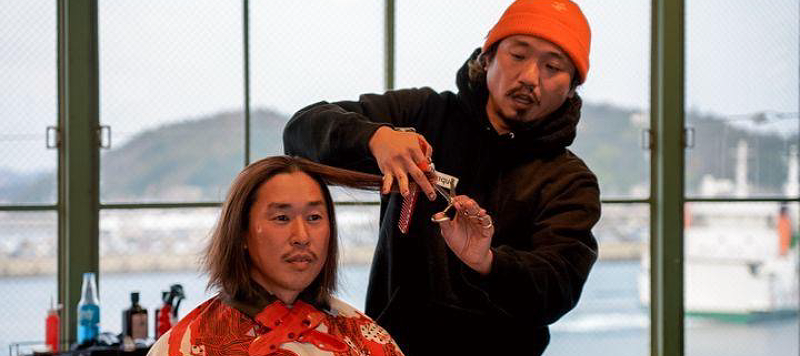
Why did you decide to become a barber?
My official reason was that I was good with my hands [laughs]. The honest reason was that it seemed easy.
Could you expand on that?
When I was a teenager, I felt that all the barbers in the world were living a free and easy life.
There was a row of barbershops on my way to school, and when I looked at the barbers, I saw them sitting on their seats reading the newspaper in the morning, and in the evening, they were either sleeping with their mouths open or watching TV.
They hardly looked like they were working. I thought, “That's very nice.” That was the first time triggering me to be a barber.
Have you changed your thoughts since you became a barber?
More than 90% of the barbers in Japan are individual business owners. Everyone is really living as they wish and doing as they please. Thinking about it again, I guess I wasn't wrong [laughs]. I also feel that I am getting closer and closer to the image I longed for when I was a teenager.
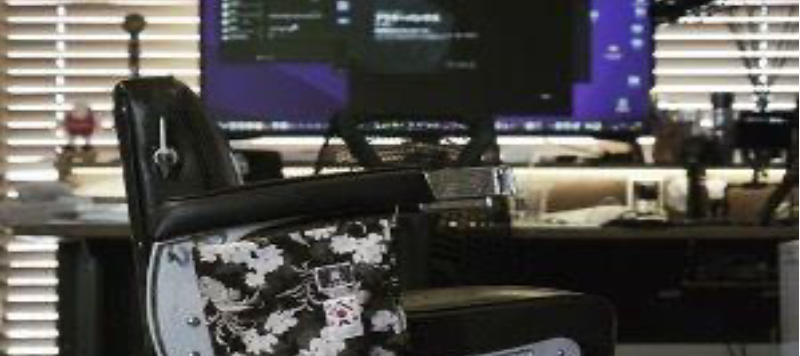
Inside Nakamura’s barbershop
"A barbershop is like a room where friends come to hang out. I wanted to create a cape that would blend in the shop."
Why did you start Barber & Apparel Nakamura Shoten?
About 10 years ago, I started promoting my barbershop on social media. When I took the pictures for promotion, I found that the pure white synthetic fiber cape that I put on customers caught the attention in most of the photos, then I thought, “It doesn't look cool.”
So, branding on social media was the trigger of starting the e-shop?
Yes, it was. But “barbershop” and “hair salon” have different nuances. For example, in a hair salon the customers are more concerned with the hairstyle created by the hairdresser, so they don’t care even if the cape is completely white.
However, in a barbershop that men like to go to, focus goes to the atmosphere of the place, the looseness of the owner, and the environment in which the owner spends his time. All these are packaged together to form a brand. Then I felt that we needed a cape that reflects these.
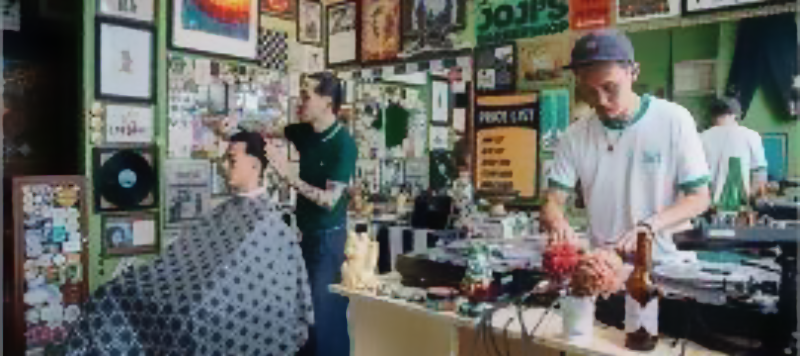
JOJI'S BARBERSHOP in Sydney, Australia uses “ASA”, a cape from Barber & Apparel Nakamura Shoten.
I see. So, you are particular about capes along with interior design.
That's right. It is important to harmonize the entire barbershop with your unique sense of style.
I think barbers are very particular and many of them are like “social misfits” in a good sense. The barbers I admired were also people who lived for their hobbies, prioritizing fishing, or being obsessed with coaching softball. Barbershops tend to be run by people who have a unique sense of style.
All these particular tastes and quirks compile within the shop to make a room. It is not just “a place to welcome customers” but “a stylish place where friends come and hang out,” so to speak. That is why a white cape would not be appropriate there. With this in mind, I created printed capes.
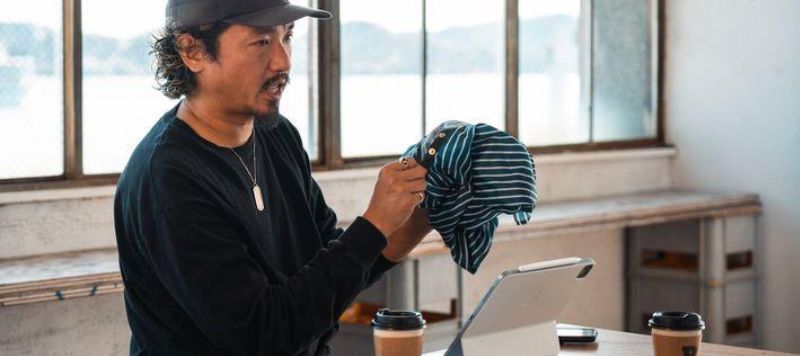
Mr. Hiroshige Nakamura with his products.
Many of your capes have unique prints. Are you designing them?
My wife is the designer. I then add context to her designs and build the story. I commercialize designs that I can imagine the scenes in which they are used.

Mrs. Keiko Nakamura, wife of Mr. Nakamura, designing a cape
I like psychedelic designs, and I am also fond of glitches that have become trendy recently. Glitch is a design technique that intentionally creates chaos and irregularity. I like such expressions, the way an existing form is broken, or the breaking of something formal.
For example, the product “WTF” is a traditional Ukiyo-e design (Japanese woodblock prints) with dots overlaid on it to give it a modern update.
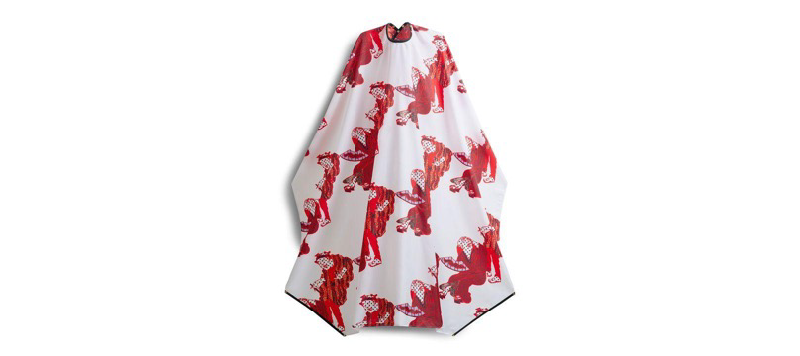
“WTF”: A work by Hirokage Utagawa, an Ukiyoe artist from the Edo period, that depicts a scene in which a barber cuts too much hair of a customer, which made them laugh. Mr. Nakamura was inspired by this and commercialized the product.
"Regardless of the motive, just give it a try."
Your business fits the category of what is called cross-border e-commerce, but since when did you expand your business overseas?
We did not intentionally expand overseas. One of the reasons is that one of our first customers was an overseas buyer.
Oh, is that right!
Yes [laughs]. When I posted my first red tartan-checked cape on Facebook, a buyer from FREEMANS SPORTING CLUB, a men's clothing shop and barbershop in New York, sent me an email and said, “This cape is so cute, I want it. Could you send it?” That was back in 2014.
Then, a barbershop in New York saw the social media post of FREEMANs SPORTING CLUB and contacted us. At the time, we didn’t have an e-commerce site, so we communicated with them via emails.
Word of mouth gradually spread from New York to California and then to the rest of the country. Now we are receiving orders from barbershops in Europe and Asia.
So, it spread through social media. That's very modern.
For the first year or two, our customers were mostly in New York and California. So, we started our website in English only and is now multilingual. We used a lot of photos and short form of content in English. That's how we tried to cater to overseas customers.
When you decided to create an e-commerce site, what did you consider important?
The foundation of an e-commerce site is the shopping cart and payment. I was conscious of the global standards for both for overseas customers. In my case, I first decided on a payment service and then chose a website creation tool to match that service.
Specifically, I used PayPal and Wix. The former has by far the largest number of users worldwide, and its security is robust and reliable. The latter is a good match for PayPal. This combination is the best for me. I can't find anything better than this at the moment.
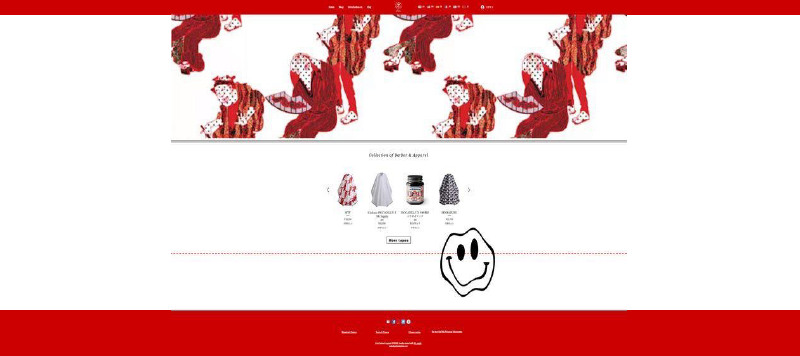
Barber & Apparel Nakamura Shoten’s website
I also appreciate PayPal's fast payment cycle. For example, if I withdraw money from my PayPal account in the morning, the money is deposited into my bank account within a few days*. As a sole proprietor like me, this is great with a time lag almost comparable to that of a bank. I also like their customer service, which is courteous.
* When there are no restrictions on the account.
Because of such ease of use, I am currently consolidating all my online store payments to PayPal. We created a barbershop without a cash register in 2014, and we used PayPal for the payment. We are also using PayPal to collect payment for annual subscription service of haircutting.
Lastly, what do you think is important for starting a cross-border e-commerce business?
The weak yen may be a tailwind now, and there may be a sense of ease in knowing that others are also starting e-commerce businesses. Whatever the motivation, just give it a try. I think it is important to have an adventurous spirit.
On the other hand, challenges always come with failures. I, too, have run into some obstacles, large and small, and overcome them. It hurts to hit a wall. However, the experience is not meaningless, and you will always discover something. Take that as a hint to improve. I believe that the repetition of this process will improve the quality of our business.
Click here for more information on Barber & Apparel Nakamura Shoten.
Click here for more information on PayPal: Hong Kong, India, Japan, Singapore
The article was first published in HUFFPOST JAPAN
# # #